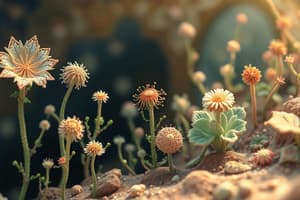Podcast
Questions and Answers
What do methanogens produce under high pressure and temperature conditions found deep inside volcanic vents?
What do methanogens produce under high pressure and temperature conditions found deep inside volcanic vents?
- Methane gas (correct)
- Oxygen
- Hydrogen sulfide
- Carbon dioxide
What technique allows scientists to directly examine DNA extracted from soil samples instead of cultivating individual bacteria?
What technique allows scientists to directly examine DNA extracted from soil samples instead of cultivating individual bacteria?
- CRISPR-Cas9
- Bioinformatics
- Metagenomics (correct)
- Traditional culture-based approaches
What is one of the challenges in understanding microorganisms mentioned in the text?
What is one of the challenges in understanding microorganisms mentioned in the text?
- They do not play a role in biodiversity
- They are not present in extreme environments
- They cannot provide insights into life beyond Earth
- Their small size requires sophisticated techniques for study (correct)
How do recent advancements in molecular biotechnologies and bioinformatics help researchers understand microorganisms?
How do recent advancements in molecular biotechnologies and bioinformatics help researchers understand microorganisms?
Which technique enables precise editing of specific bacterial genomes, leading to the potential engineering of beneficial strains?
Which technique enables precise editing of specific bacterial genomes, leading to the potential engineering of beneficial strains?
How do researchers contribute significantly to shaping our understanding of biodiversity, ecology, and evolution through exploring microorganisms?
How do researchers contribute significantly to shaping our understanding of biodiversity, ecology, and evolution through exploring microorganisms?
What are microorganisms?
What are microorganisms?
Which of the following is NOT a type of microorganism?
Which of the following is NOT a type of microorganism?
Why is Escherichia coli extensively used by scientists?
Why is Escherichia coli extensively used by scientists?
Which widely studied microbe is used in baking, brewing, and fermentation?
Which widely studied microbe is used in baking, brewing, and fermentation?
Where does penicillin, one of the first antibiotics discovered, originate from?
Where does penicillin, one of the first antibiotics discovered, originate from?
What is microbiology dedicated to studying?
What is microbiology dedicated to studying?
Flashcards are hidden until you start studying
Study Notes
Exploring Microscopic Wonders: A Peek into the Fascinating World of Microorganisms
Microorganisms — tiny living beings too small to see with our naked eyes yet profoundly impacting life on Earth. They inhabit nearly every environment imaginable, from deep ocean trenches to our own bodies. These minute creatures have shaped evolutionary history and continue to influence various scientific disciplines today. In this exploration, we delve deeper into these remarkable entities that make up the complex world of microorganisms.
Defining Microorganisms
The term 'microorganism' encompasses a variety of single-celled organisms so minuscule they require specialized equipment like microscopes to observe them. Bacteria, archaea, protozoans, algae, fungi, viruses, and prions all fall within the realm of microbiology—the science dedicated to studying these organisms.
Contribution to Life & Science
From industrial processes to medicine, food production, and environmental regulation, microorganisms play pivotal roles in maintaining balanced ecosystems and supporting human existence. Escherichia coli, commonly known as E.coli, has been extensively utilized by scientists due to its fast growth rate and ease of manipulation in genetic experiments. Yeast, another widely studied microbe, is used across multiple industries such as baking, brewing, and fermentation. Also, penicillin, one of the first antibiotics discovered, originates from mold fungi.
In addition, some microbes thrive in extreme environments where other forms of life cannot survive, providing valuable insights into potential life beyond Earth. For example, methanogens produce methane gas under high pressure and temperature conditions found deep inside volcanic vents.
Challenges and Advances
Understanding microorganisms presents unique challenges because their size necessitates employing sophisticated techniques to study them effectively. Scientists must devise innovative methods to capture compelling evidence, identify new species, and unravel mysteries hiding within microbial communities. However, recent advancements in molecular biotechnologies and bioinformatics enable researchers to better understand these organisms, particularly those inhabiting extreme environments, which were previously thought to harbor only barren landscapes.
For instance, metagenomics allows scientists to directly examine DNA extracted from soil samples instead of cultivating individual bacteria, revealing novel genes, and ecological functions never before observed through traditional culture-based approaches. Another technique called CRISPR-Cas9 enables precise editing of specific bacterial genomes, opening doors to engineer beneficial strains that can combat diseases or enhance energy production.
By exploring microorganisms, researchers push boundaries and expand frontiers, yielding invaluable information that contributes significantly to shaping our understanding of biodiversity, ecology, and evolution. As we further discover the intricate relationships between humans and microbes, we may uncover exciting opportunities for future innovations in healthcare, agriculture, biotechnology, and beyond.
Studying That Suits You
Use AI to generate personalized quizzes and flashcards to suit your learning preferences.




